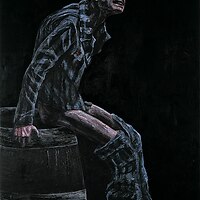Why do we give fictitious testimony?

The testimonies may be fictitious but the sentiments we have experienced are not. As a means to call up emotions they are not necessarily untrue.
Is it possible to form a social community as human beings if we can not experience other peoples feelings. We rarely take part in the events or witness the story of the other person. How then can we feel compassion with our families, friends, colleagues, lovers or strangers. How can we put ourselves in the shoes of our opponent or the generation before us.
What we do is, we put ourselves in their position, we try to indentify with the other person, we look for similarities with our own lives. We attempt to create an image of the events we weren’t a part of. A picture which evokes the desired emotion. This happens everyday in our life, watching the news or internet and in art. You could say that we dishonour the truth, that we’re lying. But it’s not the truth we’re talking about, it’s the experience, the feeling that comes with it. If you watch the crucifixion of Christ in any Catholic church, you know it’s not Christ you’re looking at but a body double and still you believe in his suffering.
In the earlier example of the testimonies about dr. Mengele the same occurs but the other way round. How do you express the horrors of the concentration camps when it’s hard to even speak about it. Mentioning the name Mengele is sufficient to convey the horrors you have suffered.





